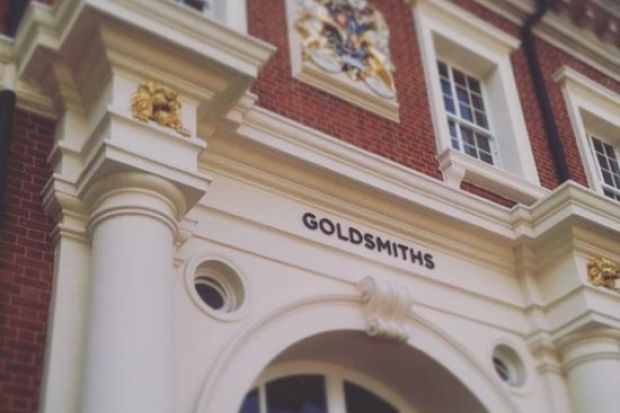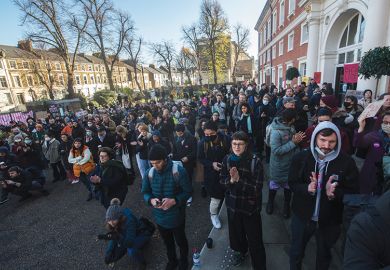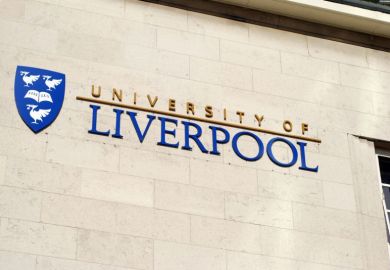Goldsmiths, University of London has been hit with the ultimate sanction of a global academic boycott by the UK’s main higher education union.
The institution became the third to be “greylisted” by the University and College Union in the space of 12 months as a long-running dispute over plans to cut up to 46 jobs – the subject of a three-week strike that ended last month – remains unresolved.
The boycott means that the union is asking members and the international academic community to refuse to speak at conferences or events at Goldsmiths that do not directly relate to core teaching duties and to turn down opportunities to act as external examiners for the institution.
The UCU took the action after claiming that management planned to “rank and yank” academics based on their skills and achievements in order to decide who is dismissed.
The institution is seeking to dismiss up to seven academics in its English and creative writing department and a further seven historians, plus up to 32 professional services staff.
The backdrop to the row is mounting financial difficulties at Goldsmiths, which reported a £6.5 million deficit last year, and a £12 million loss the year before. The college blames growing staff expenditure, costs relating to Covid-19, including the loss of overseas student income, and government funding cuts.
But critics point to the university’s decision to sign up to “punitive” new financial covenants with the institution’s banks – arguing that senior management panicked in the depths of the pandemic and sought new credit in fear of worst-case scenarios that never materialised.
Last year, the college agreed a deal with Lloyds and NatWest “to amend the terms” of existing loan facilities totalling £12.5 million, while gaining access to two new short-term credit facilities of £5 million and £7 million, accounts show. The agreement involved “revision to the financial covenants” – commitments that borrowers will operate within rules set by the lender.
As it turned out, the college did not make use of the first short-term credit facility (the second runs for six weeks up to 26 May 2022).
The Goldsmiths UCU branch says its call for senior management to release the full terms of the new covenants with the banks has been refused. But according to those in the union with some knowledge of the agreement, the college has moved from having covenants based on staying within certain a debt-to-assets ratio, to those involving cash levels and EBITDA (earnings before interest, taxes, depreciation and amortisation), a measure of financial performance.
The UCU argues that the new covenants in effect require the college to rapidly move to permanent surplus – and that because cost-cutting measures such as selling off buildings cannot help the college meet the EBITDA covenant, they make major job losses inevitable.
Jo Grady, the UCU general secretary, said Goldsmiths’ leaders “have not only disastrously mismanaged the university but are now using disgraceful rank and yank tactics to get rid of staff. It is little wonder staff and students at Goldsmiths are all united in opposing these shameful cuts.
“It is rare for UCU to call for a global academic boycott, and doing so reflects the seriousness of the situation. We are calling on academics throughout the world to join us in boycotting the university until management cancel the compulsory redundancies,” Dr Grady said.
The UCU greylisted the University of Liverpool in July 2021 and the University of Leicester in May 2021 in separate disputes over redundancies.
A Goldsmiths spokesman said that the university “needs to save £9 million in ongoing spend over the next two years to put the college back on a sustainable financial footing”, and that the English and history departments had been unable to meet their savings targets, hence the risk of redundancies.
“The real losers from any ‘global boycott’ are likely to be our local communities. Such a move threatens to undermine our work with local partners and will only damage communities in the Lewisham area struggling to recover from the pandemic and risks depriving local young people of the chance to learn new skills and discover new opportunities,” the Goldsmiths spokesman said.
“Goldsmiths has repeatedly invited Goldsmiths UCU to join the college at ACAS [the Advisory, Conciliation and Arbitration Service] for talks with no preconditions on either side to help find a shared way forward. So far, this offer has been rejected, but we remain ready to meet.”
Register to continue
Why register?
- Registration is free and only takes a moment
- Once registered, you can read 3 articles a month
- Sign up for our newsletter
Subscribe
Or subscribe for unlimited access to:
- Unlimited access to news, views, insights & reviews
- Digital editions
- Digital access to THE’s university and college rankings analysis
Already registered or a current subscriber?








